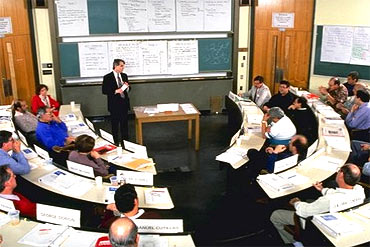 | « Back to article | Print this article |
'Job market in India better than US, Europe'
Robert Bruner, Dean of Darden School of Business, University of Virginia who visited India recently, expressed his views about the global economic situation.
In this interview, he also translates what the current situation implies for the job market and to finance graduates across the country. Bruner emphasises that even fresh graduates who have a good academic background in economics and possess excellent analytical skills can revive the current situation.
Bruner is of the view that management education is extremely important for finance graduates and choosing a good business school that offers quality experience is the need of the day.
Now that the world economy is on the verge of decline, how good is the scene for finance graduates across the world?
I think it's a very challenging situation. The economy is not in a good shape, so obviously a lot of big firms in the world will be hard pressed to make a choice whether to continue the race of survival or to shut down and stay quiet for a while.
At the same time, a lot of projects that were announced to be under the pipeline will be put on hold until further notice. So, definitely, it's a challenging situation and it has always been.
All this while, the governing economies failed to gauge the magnitude of the crisis and covered things up on the top, but failed to realise that the root cause of the crisis continued to exist and may storm up any moment.
Today, we are witnessing a similar situation. Although the government may come up with a remedial action to sustain in the market, the debt situation is going to last at least for a while.
'Healthcare, energy and consulting firms will produce more jobs'
Which are the countries that are worst affected by the crisis? What are the job prospects for Indian students?
We all know that Greece is the most affected, so are other parts of Europe. United States is not far behind. However, these are developed economies, so the impact is huge. But countries like India, which are developing economies, although reasonably hit, can still survive. So the job market is considerably better for students in India.
In your opinion, what are the sectors that will produce jobs for finance graduates?
I think healthcare, energy and consulting firms will produce more jobs in the years to come.
Why do you think management education is important for students?
I think it is crucial as it will help students move from their speciality to understand general management, how it works and how to prepare oneself to be a manager of situations. It will teach students and prepare them to lead a team, a group or an organisation.
While you will always find people who think broad, in financial management, you need to think vertically (deep) as well.
'Indian students are well prepared on the technical front'
While we do value entrance scores, we also look for students who have a fair understanding of the economic terms, a little bit about the global trends, and at the same time, I would pick a student who has an analytical understanding of a given situation.
Although it is important to have information about financial terms and be confident about your opinion, it is also important to be open and broad minded about understanding that situations change over time and one need to change accordingly.
When you think of pursuing financial management as a career, you need to be aware of the technological advancement, be calm and prepared to manage crisis situations.
As a manager, you will also be required to learn to manage teams across different parameters. These are some of the values we teach at Darden School and these are very essential for every manager, irrespective of what sector he/she chooses to work in.
What is your opinion about the performance of Indian students?
I think Indian students are well prepared on the technical front. They are willing to learn and that's what we like about them.
What facilities do you think an institute should ideally provide to make a good financial manager out of a graduate?
- It is important to provide students with a good amount of knowledge about Economics and diversity of a given situation, thus exposing them to the 'global perspective'.
- It is important to help them gain mastery of business acumen. This includes brushing their skills to help them understand how to negotiate, provide feedback, criticise, motivate, influence and importantly, influence.
- It is important that the student must have a good work character. This means that he must understand and realise the importance of work ethics. Ethics may differ from organisation to organisation. So, we must try and give them an objective understanding of what is ethical and what is not, but at the same time, biases exist when it comes to action. MBA graduates are taught to analyse, for the same reason so that they know that there could be two ways of dealing with a situation. Under work ethics, one should also teach them values of integrity and dignity of labour.
- We believe in practice-based education. Try and give them as many case studies as possible. This will help create empathy in their minds which will directly or indirectly help them arrive at a more informed decision.
- Also, it is important to have student exchange programmes with institutes from other countries. Such an initiative enables interaction and exposes students to study/work in a different country during their course of study and help them have a better understanding of the culture, laws and geography of different country. This exposure is essential for every manager.
'In India, rote learning is common'
In countries like India, rote learning is common. They are aware about financial and accounting terms, spreadsheets etc, but when it comes to taking a financial decision, they think a lot. Institutes must try and work to develop communication skills, namely public speaking and writing skills among students.
Clubs/Unions can be a great source of developing public speaking and leadership skills as students will be required to present their analysis and opinion on a given subject. Reading a financial newspaper daily is a must.
I would recommend reading The Economist, Harvard Business Review, New York Times, Financial Times of London besides your local newspaper and a leading financial daily from the country you live in. Biographies of famous people and great leaders also add to developing the quality of sensitivity in the individual reading it. It is also important to read the most recent book on financial laws across countries. Students also need to be aware of the diversity and history of culture, geography and economics of a certain region of work before presenting an analysis or making a suggestion
What is your advice to students who would like to apply to a University abroad?
I think it is very important to do your homework well and pick a college/university that suits your skills and interest.
At the same time, while choosing a University, do take into consideration the quality of experience you will get to enjoy at the Institute rather than simply going by the cost of education or be influenced by external information.
In the end, it all comes down to not what you as an individual need to achieve but it's all about what you intend to achieve. There is a difference between the two.



